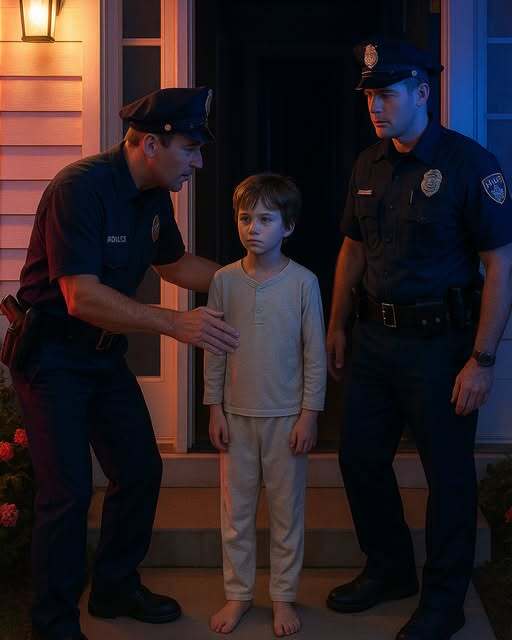
In the quiet hours of a cool suburban night, when most homes slept under the soft hum of streetlights, a seven-year-old boy named Leo did something extraordinary. His small, trembling hands dialed three numbers — numbers that would change everything.
The Night of the Whisper
It was 2:30 a.m. on Elm Street, the kind of peaceful neighborhood where nothing ever seemed to go wrong. Inside one colonial-style house, that peace had already cracked.
Leo crouched inside the master bedroom closet, holding his baby sister Chloe, who slept soundly in a laundry basket beside him. From beyond the slats, voices drifted through the air — his mother’s pleading tone, his father’s strained words, and a third voice, deep and cold, one that didn’t belong.
Before hiding, his mother had knelt beside him. “Stay quiet. Protect your sister,” she whispered, pressing her phone into his small hand. “Only if you have to, call 911.”
Now, as shadows moved across the room, Leo felt the weight of those words. He could see the glow of the phone lying on the carpet. His heart thudded hard enough to make his body shake, but courage can live even inside fear.
He crawled out silently, grabbed the phone, and ducked back into the closet.
“911, what’s your emergency?” came the calm voice on the line.
Leo whispered so softly it was almost air. “Help… my parents… they need help.”
Before he could say more, the floorboards creaked. A heavy shadow fell across the closet door. The phone was snatched from his hand. The line went dead.
The Dispatcher Who Listened
At the county dispatch center, veteran operator Frank Miller leaned over his desk as the whisper came through his headset. It lasted only seconds, but he recognized the sound immediately — a child’s voice coated in terror.
“Help… my parents…”
Then silence.
Frank’s fingers flew across the keyboard. “Trace that signal. Get me location coordinates,” he ordered. “This is a priority one.”
He’d taken thousands of calls in twenty years, but something about this one stayed in his bones. It wasn’t just fear he heard; it was love — the raw kind that pushes a child to do what even adults might not.
The House on Elm Street
Minutes later, Officers Dave Wallace and Ben Carter pulled up in front of the house. The porch light was off, but a child’s bike lay tipped over in the yard. Wallace approached the door and knocked.
“Emory County Police! Is anyone home?”
No answer. He knocked again, louder. Then the latch clicked.
A little boy appeared — pajama-clad, eyes wide but steady.
“Did you call 911?” Wallace asked gently.
Leo nodded. “My parents,” he whispered, pointing down the hall.
Carter knelt beside him, keeping the boy close while Wallace followed the direction of his small hand.
Inside the Room
The air was tense and unnaturally still. When Wallace reached the end of the hallway, he pushed the door open — and froze.
Leo’s parents were sitting against the wall, their wrists bound, mouths taped. Standing beside them was a man with a glinting object in his hand, something sharp that caught the dim light.
“Police!” Wallace’s voice filled the room. “Put it down and step away!”
The man jolted, startled, then dragged the mother closer, using her as a shield.
“Back off!” he barked, the edge of panic cutting through his voice.
For a breathless second, the world held still. Then, from behind Wallace, came a sound small enough to break any heart — a child’s trembling whisper.
“Please… don’t hurt my mom.”
Leo had followed, standing in the doorway, his tear-streaked face lit by the hall light. That brief distraction — that pure, terrified plea — was enough.
Wallace lunged forward, knocking the weapon from the intruder’s hand while Carter swept in to pull the mother clear. The struggle was over in seconds. The man was cuffed, the family freed.
Safe at Last
Wallace cut the bindings from the parents’ wrists, and Carter peeled away the tape. The mother immediately gathered both children, holding them as though she’d never let go again.
“You were so brave,” Leo’s father whispered, pressing his forehead to his son’s.
Outside, red and blue lights danced across the houses. Neighbors peered through blinds, but inside, there was only the sound of steady breathing and quiet sobs.
When Wallace crouched beside Leo, he smiled softly. “You did the right thing,” he said. “You saved your family.”
Leo nodded, clutching his mother’s sleeve. He didn’t say another word — he didn’t need to. His whisper had already spoken loud enough.
What Courage Looks Like
Later, at the station, Dispatcher Frank listened again to the brief, broken call — the whisper that had started it all. It lasted less than five seconds, but those five seconds had brought officers to the right house, at the right time, to save a family.
In training manuals, they call it “effective emergency response.” But everyone who worked that night knew what it really was: a child’s courage meeting the world’s compassion halfway.
That night, Leo proved something most adults forget — bravery isn’t the absence of fear. It’s acting through fear when someone you love needs you most.
And somewhere on Elm Street, in a house where laughter had returned, a little boy fell asleep between his parents, holding his baby sister close — knowing the dark couldn’t hurt them anymore.
